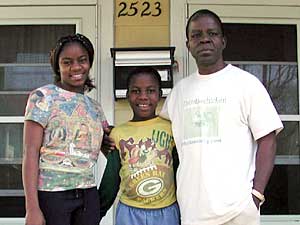May 15, 2005
 |
| Moses Hyneh and two of his children at their Minneapolis home. (MPR Photo/Julie Siple) |
Minneapolis, Minn. — Moses Hyneh is from Harper, a city in Maryland County, Liberia. He was born in 1953 and belongs to the Grebo ethnic group.
Hyneh left Liberia on Sept. 25, 1990, to escape war. He and his family lived in a refugee camp in the Ivory Coast until civil war struck that country as well. A resettlement program allowed Hyneh to come to Minnesota.
He arrived on May 19, 2004, with three of his children. His wife remains in the Ivory Coast with a fourth child, and Hyneh has filed a petition to bring them to the U.S. Hyneh now lives in south Minneapolis.
Hyneh worked for the government of Liberia before the country's political instability. Then, while living in the Ivory Coast, he was ordained a pastor. Here in Minnesota, he works overnight at Sam's Club.
A nation of three million people on the west coast of Africa, Liberia was founded as a home for freed African-American slaves in the 1800s.
The country was relatively stable for more than a century, until a coup in 1980 overthrew an elected government. In 1989, a rebel uprising led by Charles Taylor resulted in civil war. Taylor was later elected president.
In August 2003, a peace agreement ended 14 years of civil war and led to Taylor's resignation. Today Chairman Gyude Bryant heads the transitional government, and the United Nations maintains a strong presence in the country.
Civil war destroyed much of Liberia's economy, especially the infrastructure of Monrovia. Today thousands of Liberian refugees remain in other west African countries. English is the official language of Liberia, although a number of ethnic group languages are also spoken.






